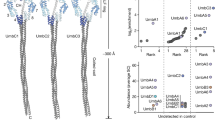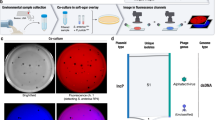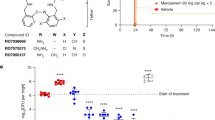Abstract
THE choice of the imperfect mould Penicillium chrysogenum to produce penicillin on an industrial scale1 restricted a genetical approach to increasing penicillin yield, and only methods involving mutation and selection could be used because of the absence of sexuality. Later, the discovery of parasexuality2 and its demonstration in Penicillium chrysogenum3,4 led to several investigations5–8, but none indicated that this genetical recombination process could readily be exploited to produce strains of use to industry.
This is a preview of subscription content, access via your institution
Access options
Subscribe to this journal
Receive 51 print issues and online access
$199.00 per year
only $3.90 per issue
Buy this article
- Purchase on Springer Link
- Instant access to full article PDF
Prices may be subject to local taxes which are calculated during checkout
Similar content being viewed by others
References
Raper, K. B., and Alexander, D. F., J. Elisha Mitch. Soc., 61, 74 (1945).
Pontecorvo, G., and Roper, J. A., J. Gen. Microbiol., 6, vii (1952).
Pontecorvo, G., and Sermonti, G., Nature, 172, 126 (1953).
Pontecorvo, G., and Sermonti, G., J. Gen. Microbiol., 11, 94 (1954).
Sermonti, G., Ann. NY Acad. Sci., 81, 950 (1959).
Macdonald, K. D., Antonie van Leeuuwnhoek, 32, 431 (1966).
Macdonald, K. D., Hutchinson, J. M., and Gillett, W. A., J. Gen. Microbiol., 33, 385 (1963).
Macdonald, K. D., Hutchinson, J. M., and Gillett, W. A., Genetica, 36, 378 (1965).
Foster, J. W., and Karow, E. O., J. Bact., 49, 19 (1945).
Dulaney, E. L., Mycologia, 39, 570 (1947).
Dulaney, E. L., Mycologia, 39, 582 (1947).
Pontecorvo, G., Roper, J. A., Hemmons, L. M., Macdonald, K. D., and Bufton, A. W. J., Adv. Genet., 5, 141 (1953).
Kafer, E., Adv. Genet., 9, 105 (1958).
Dorn, G. L., Genetics, 56, 619 (1967).
Grindle, M., Heredity, 18, 191 (1963).
Grindle, M., Heredity, 18, 397 (1963).
Jinks, J. L., Caten, C. E., Simchen, G., and Croft, J. H., Heredity, 21, 227 (1966).
Holt, G., and Macdonald, K. D., Antonie van Leeuwenhoek (in the press).
McCully, J. S., and Forbes, E., Genet. Res., 6, 352 (1965).
Lhoas, P., Nature, 190, 744 (1961).
Author information
Authors and Affiliations
Rights and permissions
About this article
Cite this article
HOLT, G., MACDONALD, K. Isolation of Strains with Increased Penicillin Yield after Hybridization in Aspergillus nidulans. Nature 219, 636–637 (1968). https://doi.org/10.1038/219636a0
Received:
Issue Date:
DOI: https://doi.org/10.1038/219636a0
This article is cited by
-
Cloning, characterization of the acyl-CoA : 6-amino penicillanic acid acyltransferase gene of Aspergillus nidulans and linkage to the isopenicillin N synthase gene
Molecular and General Genetics MGG (1990)
Comments
By submitting a comment you agree to abide by our Terms and Community Guidelines. If you find something abusive or that does not comply with our terms or guidelines please flag it as inappropriate.



